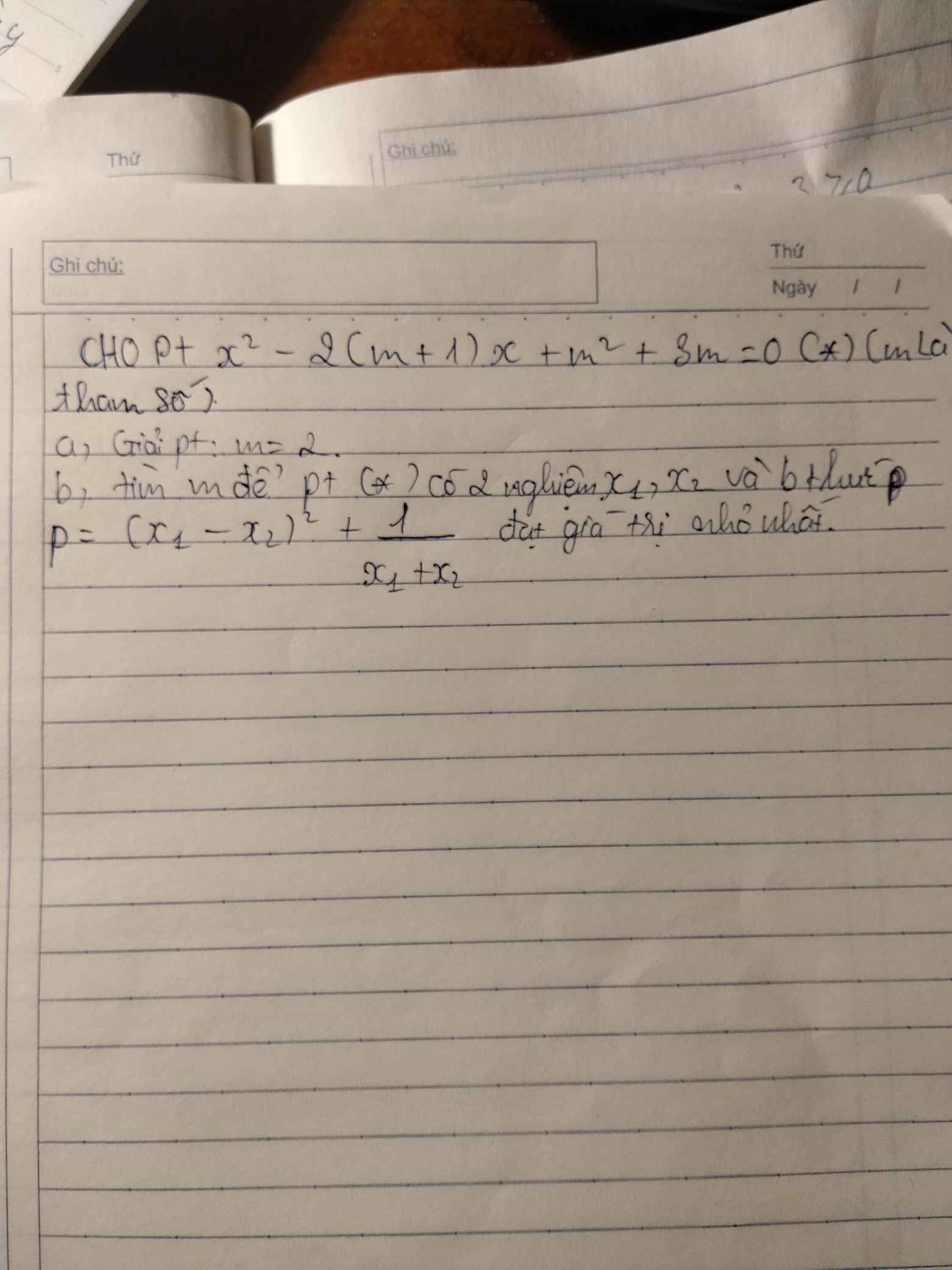Cho pt x²-2(m+1)x+m²+3m=0(*) (m là tham số) tìm m để pt (*) có 2 nghiệm 
Hãy nhập câu hỏi của bạn vào đây, nếu là tài khoản VIP, bạn sẽ được ưu tiên trả lời.


\(\text{Δ}=\left(2m-2\right)^2-4\left(m^2-3m\right)\)
\(=4m^2-8m+4-4m^2+12m=4m+4\)
Để phương trình có nghiệm thì 4m+4>=0
hay m>=-1

a.
Khi \(m=2\) pt trở thành:
\(2x+3=0\Rightarrow x=-\dfrac{3}{2}\)
b.
Để pt có nghiệm \(x=-1\)
\(\Rightarrow\left(m^2-m\right).\left(-1\right)+m^2-1=0\)
\(\Leftrightarrow-m^2+m+m^2-1=0\)
\(\Leftrightarrow m-1=0\)
\(\Leftrightarrow m=1\)
c.
Pt tương đương:
\(\left(m^2-m\right)x=-\left(m^2-1\right)\)
\(\Leftrightarrow m\left(m-1\right)x=-\left(m-1\right)\left(m+1\right)\)
Pt vô nghiệm khi:
\(\left\{{}\begin{matrix}m\left(m-1\right)=0\\-\left(m-1\right)\left(m+1\right)\ne0\end{matrix}\right.\) \(\Leftrightarrow m=0\)
\(\Rightarrow\) pt có nghiệm khi \(m\ne0\)
Pt có vô số nghiệm khi:
\(\left\{{}\begin{matrix}m\left(m-1\right)=0\\-\left(m-1\right)\left(m+1\right)=0\end{matrix}\right.\) \(\Leftrightarrow m=1\)
Lời giải:
a. Khi $m=2$ thì pt trở thành:
$2x+3=0\Leftrightarrow x=-\frac{3}{2}$
b. Để pt có nghiệm $x=-1$ thì:
$(m^2-m).(-1)+m^2-1=0$
$\Leftrightarrow m-1=0\Leftrightarrow m=1$
c.
PT $\Leftrightarrow (m^2-m)x=1-m^2$
Để pt vô nghiệm thì: \(\left\{\begin{matrix} m^2-m=0\\ 1-m^2\neq 0\end{matrix}\right.\Leftrightarrow \left\{\begin{matrix} m(m-1)=0\\ (1-m)(1+m)\neq 0\end{matrix}\right.\)
\(\Leftrightarrow m=0\)
PT có vô số nghiệm khi \(\left\{\begin{matrix} m^2-m=0\\ 1-m^2= 0\end{matrix}\right.\Leftrightarrow m=1\)
Để PT có nghiệm thì: $m\neq 0$

a: Thay m=2 vào pt, ta được:
\(x^2-2x+2=0\)
hay \(x\in\varnothing\)
b: \(\Leftrightarrow\left(2m-2\right)^2-4\left(m^2-3m+4\right)>0\)
\(\Leftrightarrow4m^2-8m+4-4m^2+12m-16>0\)
=>4m>12
hay m>3

\(2)mx^2-2\left(m-1\right)x+m-1=0\)
Để pt có nghiệm kép \(\Leftrightarrow\left\{{}\begin{matrix}a\ne0\\\Delta=0\end{matrix}\right.\)
\(\Leftrightarrow\left\{{}\begin{matrix}m\ne0\\\left[-2\left(m-1\right)\right]^2-4m\left(m-1\right)=0\end{matrix}\right.\)
\(\Leftrightarrow4\left(m^2-2m+1\right)-4m^2+4m=0\)
\(\Leftrightarrow4m^2-8m+4-4m^2+4m=0\)
\(\Leftrightarrow-4m+4=0\)
\(\Leftrightarrow m=1\)
Vậy để pt trên có nghiệm kép thì \(\left\{{}\begin{matrix}m\ne0\\m=1\end{matrix}\right.\)

a Khi m=1 thì (1) sẽ là x^2+1=0
=>x thuộc rỗng
b: Thay x=1 vào (1),ta được:
1^2-2(m-1)+m^2=0
=>m^2+1-2m+2=0
=>m^2-2m+3=0
=>PTVN
c: Thay x=-3 vào pt, ta được:
(-3)^2-2*(m-1)*(-3)+m^2=0
=>m^2+9+6(m-1)=0
=>m^2+6m+3=0
=>\(m=-3\pm\sqrt{6}\)

a: Khi x=2 thì pt sẽlà 2^2-4m+3m-4=0
=>-m=0
=>m=0
c: Để PT có hai nghiệm tráo dấu thì 3m-4<0
=>m<4/3
d: Δ=(-2m)^2-4(3m-4)
=4m^2-12m+16
=(2m-3)^2+7>=7
=>Phương trình luôn có hai nghiệm pb
Để PT có 2 nghiệm dương thì 2m>0 và 3m-4>0
=>m>4/3
Để pt có nghiệm thì \(\Delta'=\left(m+1\right)^2-\left(m^2+3m\right)\ge0\Leftrightarrow1-m\ge0\Leftrightarrow m\le1\)
a)Tự làm
b)Để pt có hai nghiệm <=>\(\Delta=4\left(m+1\right)^2-4\left(m^2+3m\right)=-4m+4\ge0\)
<=>\(m\le1\)
Theo viet: \(\left\{{}\begin{matrix}x_1+x_2=2\left(m+1\right)\\x_1x_2=m^2+3m\end{matrix}\right.\)
Có \(P=\left(x_1-x_2\right)^2+\dfrac{1}{x_1+x_2}\)(đk: \(x_1+x_2\ne0\Rightarrow m\ne-1\))
\(=\left(x_1+x_2\right)^2-4x_1x_2+\dfrac{1}{x_1+x_2}\)
\(=4\left(m+1\right)^2-4\left(m^2+3m\right)+\dfrac{1}{2\left(m+1\right)}\)
\(=-4m+4+\dfrac{1}{2m+2}\)\(=\dfrac{-8m^2+9}{2m+2}\)
\(\Rightarrow P\left(2m+2\right)=-8m^2+9\)
\(\Leftrightarrow-8m^2-2mP+9-2P=0\) (1)
Coi (1) là pt bậc hai ẩn m và \(m\le1\), \(m\ne-1\)
Pt (1) có nghiệm\(\Leftrightarrow\left\{{}\begin{matrix}\Delta=4P^2-64P+288\ge0\left(lđ\right)\\m_1+m_2\le2\\\left(m_1-1\right)\left(m_2-1\right)\le0\end{matrix}\right.\)
\(\Rightarrow\left\{{}\begin{matrix}-\dfrac{1}{P}\le2\\m_1.m_2-\left(m_1+m_2\right)+1\le0\end{matrix}\right.\)
\(\Leftrightarrow\left\{{}\begin{matrix}P\ge-2\\\dfrac{9-2P}{-8}+\dfrac{P}{4}+1\le0\end{matrix}\right.\) \(\Leftrightarrow\left\{{}\begin{matrix}P\ge-16\\P\ge\dfrac{1}{4}\end{matrix}\right.\)
\(\Rightarrow P\ge\dfrac{1}{4}\)
\(\Rightarrow P_{min}=\dfrac{1}{4}\Leftrightarrow m=1\) (thỏa)
Vậy...